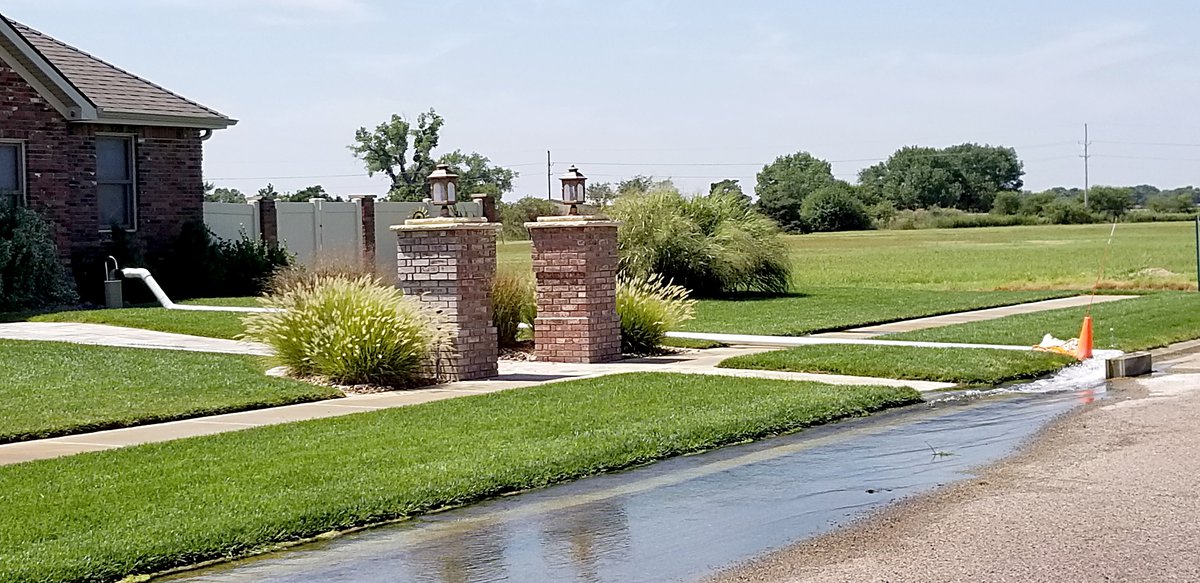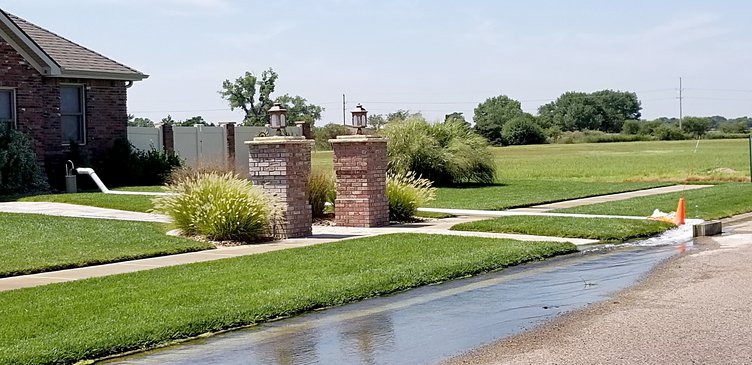On Aug. 3, several Great Bend residents living in the Amber Meadows housing development filed suit against the City of Great Bend in the U.S. District Court of Kansas in Wichita. The crux of their grievance is what they see as ongoing basement flooding caused by the city’s actions.
The issue was the subject of a Great Bend City Council executive session Monday night. The council reconvened in open session and took no action.
However, in a statement, the city “denies the claims they make.”
Problems in the northwestern Great Bend development arose during last year’s wet spring which caused flooding and filled Veterans Memorial Lake to the brim. Home owners in the area spent much of the summer and fall pumping water out of their basements.
Many of these residents attended a council meeting last May to complain. The city initiated a groundwater study in June, but pulled the plug as it became too costly.
They seek a judgment against the city in an amount in excess of $75,000, as well as attorney fees, their costs and interest “plus any other and further relief as the Court might deem just or equitable.”
The case is assigned to Chief District Judge Robinson. No court dates have been set.
The suit
The Great Bend Tribune obtained a copy of the filing, a public record, from the U.S. District Court of Kansas in Wichita.
The listed defendants were: Brett And Kinzie Behrends; Colleen and James Breitenbach; Cody and Kayley Campfield; John and Shirley Koochel; Gerald and June Schneider; Bradley W. Shirer and Sarah E. Shirer; Brian and Tanya Staats; Mike and Tina Stacey; and Kyle And Breanna Whitlow. Representing them is Randall K. Rathbun with Depew Gillen Rathbun and Mcinteer of Wichita.
The city is represented by Alan Rupe and Jeff Harris of Lewis Brisbois in Kansas City. The city has not filed its response yet, but it is in the process of being prepared.
“This action arises from the ongoing flooding of the basements of the plaintiffs’ homes in the Amber Meadows Addition to the City of Great Bend, Kansas,” the plaintiff’s court filing reads. “The defendant, as developer of the neighborhood, knows full well that its decision to change the drainage course of local watersheds and divert storm water in Veteran’s Lake and other neighborhood stormwater ponds – some without discharge points – has resulted in a pattern of elevated groundwater and flooding of the plaintiffs’ basements.
“The City’s conduct has resulted in a taking under the Takings Clause of the Fifth Amendment to the United States Constitution. The City’s conduct has created a nuisance that was clearly foreseeable,” it continues.
The Takings Clause states “private property [shall not] be taken for public use, without just compensation.”
“The plaintiffs have incurred substantial damages from the defendant’s conduct including repair costs, loss of value of their homes and annoyance, inconvenience and loss of peace of mind,” the filing reads.
Here are the statements of facts listed:
• “Great Bend is located on the Arkansas River. Although the Arkansas is a mere stream at Great Bend, the defendant City lies on a vast ocean of water in the Great Bend Prairie Alluvial Aquifer. As such, the depth to groundwater is relatively shallow in the defendant City.
• “The defendant has a natural method to remove drainage water from rainfall from the various neighborhoods in the city. The City acknowledges that stormwater should be transported to the Arkansas River.”
• “Unfortunately, the defendant City’s leaders have implemented a policy decision to instead transport stormwater to lakes in the plaintiffs’ neighborhood, some of which have no discharge point. The defendant understands that water deposited in the lakes raises the water table in the plaintiffs’ neighborhood.”
• “The plaintiffs are the recipients of the stormwater the city dumps in their neighborhood lakes. To be more precise, the plaintiffs’ basements are the recipients of this stormwater.
“The plaintiffs have experienced flooding in their basements and will continue to do so until the defendant stops dumping stormwater from other neighborhoods into the nearby lakes and provides outlets to carry the water to the river. Their sump pumps run continuously in an attempt to keep their basements dry. Some of the plaintiffs have installed multiple sump pumps or dewatering wells in their yards to try to stay ahead of the City-created water table. As soon as their sump pumps/dewatering wells stop running, their basements flood.”
• “The defendant’s City official’s policy decision to move stormwater from other areas of the city to the lakes in the plaintiffs’ neighborhood has resulted in a taking of the plaintiffs’ private property for a public purpose without compensation in violation of the Fifth and Fourteenth Amendments to the United States Constitution.”
• “The defendant has created a nuisance on the plaintiffs’ properties by building stormwater ponds and changing a natural water flow and diverting stormwater from other locations in the City into lakes and stormwater ponds constructed by the defendant in the plaintiffs’ neighborhood. This stormwater would not have flowed to the subject lakes naturally but for the diversion by the City. The City, as developer of the Addition, knows the elevation of the plaintiffs’ basements and knows with reasonable certainty that flooding will result from its actions.”
• “This development is unique to most city developments because the defendant is actually the developer of the property. As such, the City has the obligation to advise buyers that the elevated groundwater table will result in the flooding of their basements. The defendant breached its duties owed as developer of this neighborhood. The defendant is liable for its failure to disclose this material information.”
• “The plaintiffs are all a failed sump pump/dewatering well away from another flood in their basements even in dry periods. This fear impacts their lives as they try to leave town for vacations or other trips.”





